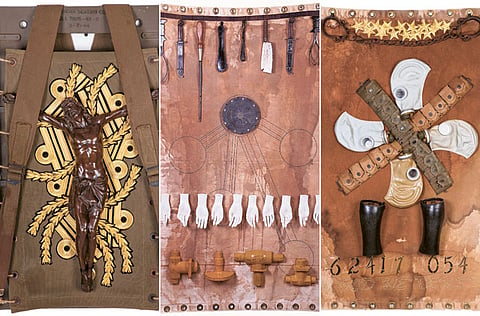Perpetually at war
Sara Rahbar puts into perspective the violence that surrounds us from the time we are born

Sara Rahbar's latest exhibition, titled Restless Violence, is disturbing yet beautiful. The artist is well known for using vintage textiles and collected objects in her compositions. But the objects she has used in the two series that form part of the exhibition — War and Confessions of a Sinner — are quite frightening. They include army bags, bullets, bayonets, gas masks, gun holsters, handcuffs, police batons and surgeons' tools. However, these objects are all arranged so artistically that the result is a set of eye-catching and thought-provoking artworks.
Rahbar was born in Iran and moved with her family to the United States when she was 5. Her earlier work, such as her well-known series of hand-sown flags, has expressed her own struggles with issues of identity and the love-hate relationship she has with the country where she grew up. Her latest work also has autobiographical undertones, but it tells a universal story of the never-ending violence that surrounds us and of our collective guilt and perennial restlessness. It makes a strong, direct statement about aggression and cruelty but also subtly alludes to the wars we fight within.
Rahbar's creative process is as interesting as the works themselves. The objects she has used have been collected over the years from flea markets, shops selling used goods, army and navy stores, and families of war veterans in Iran and the US. She has mounted them on pieces of heavy-duty tarpaulin that she has stained with coffee, mud and other organic substances. "These dirty tarpaulins reflect real life, which is dirty and stained with memories that cannot be erased," she says.
The objects are sewn on to the tarpaulin and each tells a story. A pair of gynaecologists' forceps, used for delivering babies, speaks about the violence we face from the beginning of our lives. The handcuffs, shackles, straitjackets, locks, stirrups and police batons refer to the idea of controlling others or our own lives. And things such as back braces, straps and belts represent the act of preventing yourself from falling apart. In some of the pieces, Rahbar has combined an army bag and its contents with old-fashioned farming equipment to show that a lot of people who join the army are poor farmers with few choices. And one piece features an uncomfortable-looking back brace and several old-fashioned ice skates, which suggest a feeling of being on thin ice and trying to hold oneself together. "We like to think that everything is orderly and in control, but however much we try to organise things, life is unpredictable and full of chaos. Like my artworks, it is beautifully ugly," Rahbar says.
While every piece has an autobiographical subtext, some are particularly vivid expressions of painful memories, made even more poignant by the poetic titles she gives them. In In God We Trust, her family is represented by four gas masks arranged around ammunition pouches. Right on top are the stars that signify the American dream, but just below them is a pair of shackles. At the bottom is the menacing presence of police boots and the identification number of a prisoner. The words "In God We Trust" are embroidered on the tarpaulin. "Every terrible thing that we were trying to run away from by leaving Iran happened to us in America. This work represents a time when we were so traumatised and paralysed by a situation that we could not breathe and felt as though we were just going round and round, not knowing what to do," she says.
A recurring motif in Rahbar's work is an image of Jesus Christ, most prominently in the centrepiece titled Restless Violence, which features the icon on a soldier's backpack. The artwork could be a reference to the sacrifices made by martyrs to release people from the burdens of violence, autocracy and suppression of freedom. But Rahbar sees a personal story in it. "I am not a religious person, but I have a huge collection of icons of Christ and like to use them in my work. Here, the icon represents sacrifices my mother has made all her life. And the backpack used by the Second World War soldiers to carry weapons symbolises my desire to support my mother and save her from being sacrificed," Rahbar says.
"I began this series three years ago, before the Arab uprisings, because at that time I was feeling restless and disturbed by the violence all around me. My work is not about a specific region or conflict. It is about the aggression that has always been part of our lives and how we destroy others and ourselves by war. It is about everything being out of control and the chaos that we live in. And perhaps my arrangements of these objects are an attempt to find order and balance in the chaos," she adds.
Restless Violence will run at Carbon 12 gallery until April 28.


